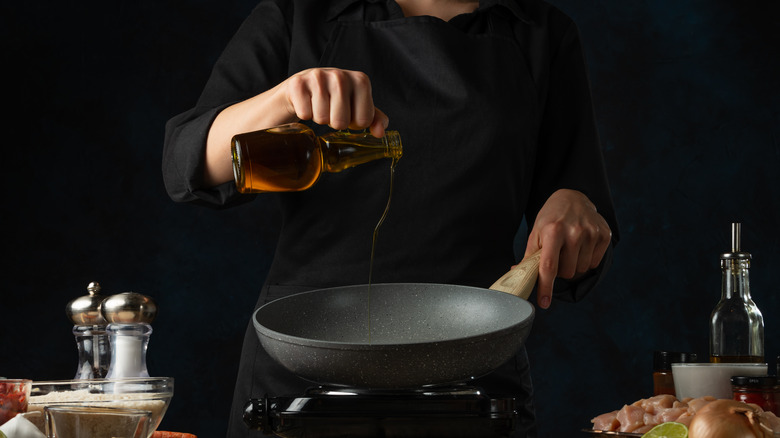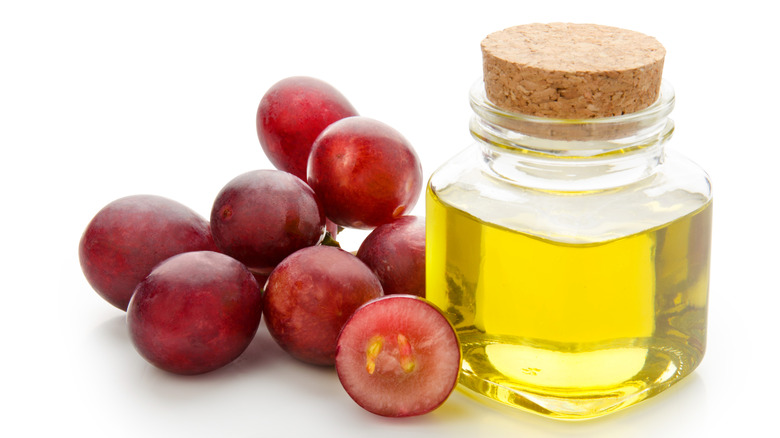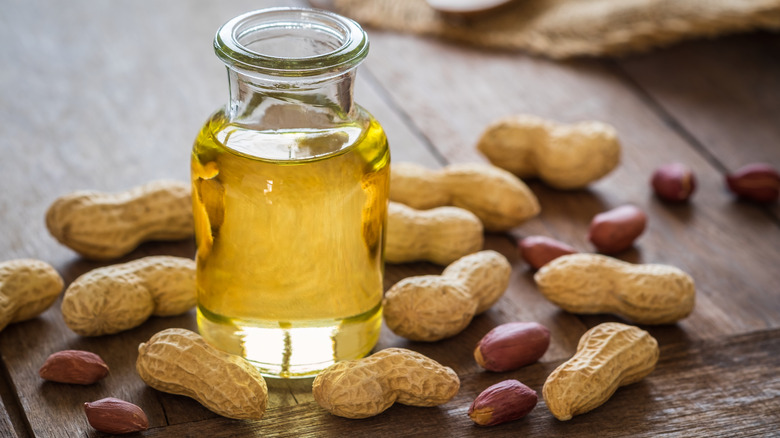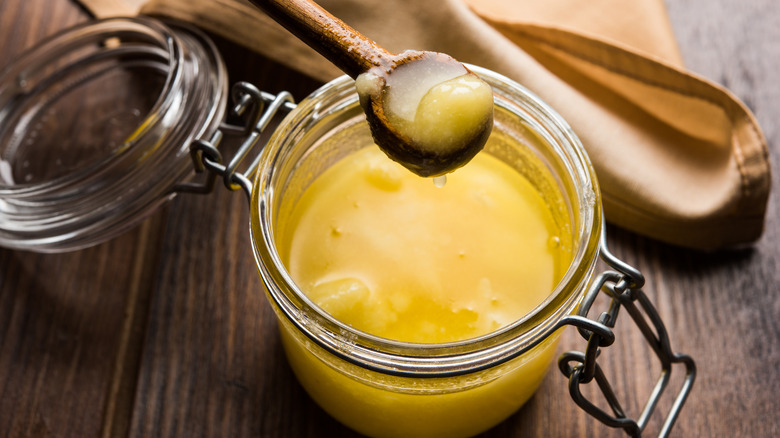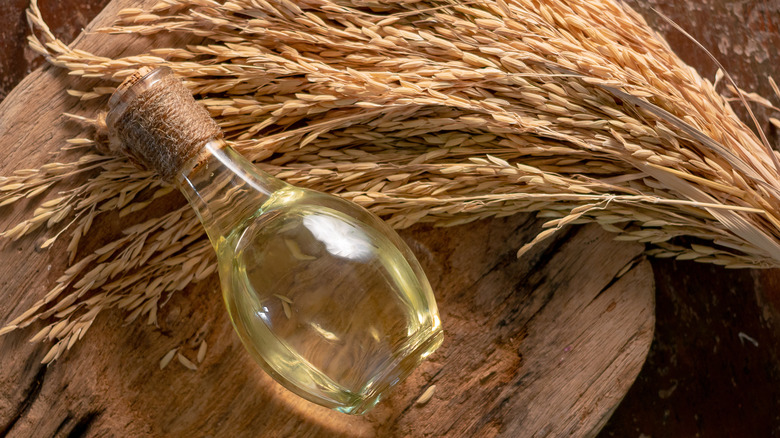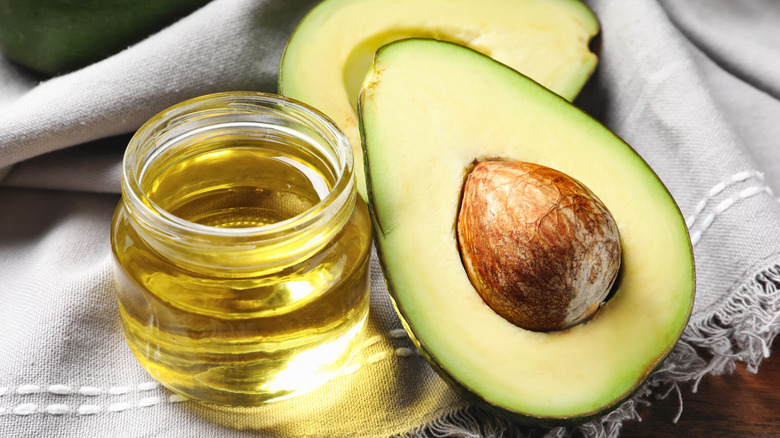The Best Oils To Use To Season Your Wok, Ranked
Cooking with a wok conjures images of a chef tossing vegetables in the air while flames shoot up from the cooktop. It may seem intimidating at first, but the wok is one of the most versatile tools in the kitchen. No matter the skill level, a wok allows you to sauté, steam, fry, and boil a wide variety of foods and will have you creating dishes that leave you looking like a pro.
The hunt for the perfect pan has been on since consumers have become more aware of the health risks associated with the coating on non-stick cookware (via The Rational Kitchen). According to Eater, carbon steel pans are the go-to for professional cooks, and top-rated woks are made from chef-preferred material. It's important to achieve nonstick status before you can create delicious dishes, and to do so, a wok must be seasoned.
A well-seasoned wok will provide a nonstick surface that allows you to get that perfect sear while also imparting flavor to your food. The Simple Wok Guide provides steps for both methods, and The Kitchn suggests using the preferred stovetop seasoning. Either method requires that your oil of choice have a high smoke point, which is the highest heat an oil can handle before it starts smoking, per Serious Eats. When seasoning your pan, you'll also want to consider flavor and health benefits that different oils impart. Here's a ranked list of the best oils:
6. Grapeseed Oil
Grapeseed oil is extracted from the seeds of grapes left over from wine production (via Bon Appétit). It is mainly used by cooks looking for an oil with a high smoke point and mild flavor. The Spruce Eats states that when dep-frying, you want an oil that won't reach its smoke point until it reaches at least 375 degrees Fahrenheit.
According to Mammafong, grapeseed oil has a smoke point of 420 degrees Fahrenheit and can endure the high temperatures needed to season a wok successfully. Often used for frying and sautéing, the neutral flavor of grapeseed oil pairs well with other ingredients and features their flavor without being overpowering. Its unobtrusive taste makes it ideal for cooks who don't want to impart much flavor to their food from the pan. It has a long shelf-life compared to other oils and can last for up to a year when stored in the refrigerator after opening, which is ideal if you want to re-season your wok over time (via Still Tasty).
5. Peanut Oil
Peanut oil may be your new go-to when looking for an oil with a little more flavor and a higher smoke point than grapeseed. According to Simply Recipes, peanut oil is extracted from the seeds of the peanut plant and comes in refined and unrefined varieties. Refined peanut oil, the variety most commonly available at the grocery store, has a mild but slightly nutty taste that will give your wok something extra to impart to your food without overwhelming it. It is preferred by fast-food chains and restaurants for its ability to maintain a neutral flavor even when frying different foods in the same batch of oil, and its high smoke point of 450 degrees Fahrenheit makes it ideal for high-heat cooking.
Folks with a nut allergy should seek an alternative oil, as peanut oil can cause a reaction despite its level of processing. Once opened, peanut oil will last about six months and should be stored in a cool, dark place to maintain shelf-life.
4. Ghee
If you're looking for an oil that will infuse a deliciously nutty flavor into your wok and food, grab the ghee. Used in Indian cuisine and medicine for thousands of years, this oil is clarified butter's more flavorful cousin.
Bon Appétit explains that it is made by cooking butter over low heat until the water begins to evaporate and the milk solids start to separate. Unlike clarified butter, when the milk solids begin to separate from the milk fat, they are allowed to caramelize before being removed. The end product is an oil with intensely buttery notes and a distinct nutty flavor and aroma. Removing water and milk solids during the slow-cooking process creates an oil that is incredibly shelf-stable with a high smoke point of 465 degrees Fahrenheit. Fun side note: The lack of milk solids also makes ghee a lactose-intolerant friendly oil that still has all the good butter flavor vibes.
3. Sunflower and Safflower Oil
Often used interchangeably because of their similarities, sunflower and safflower oil are two effective options to use when looking to season your wok with a healthy, mild-flavored oil that can handle the heat. According to Centra Foods, these oils are categorized as high oleic, mid oleic, and linoleic according to their monounsaturated and polyunsaturated fat content.
When searching for a "healthier fat," the foodservice industry utilizes high oleic sunflower and safflower oil because they are comprised of mainly monounsaturated fats. Although the oils are derived from two different plants, the benefits of using them to season a wok are very similar. Both oils are mild in flavor and similar in price point, although sunflower oil has more readily available varieties. Safflower oil has a smoke point of 450 degrees Fahrenheit compared to Sunflower oil's 440 degrees (per The Globe and Mail). Sunflower and safflower seeds produce two predominantly monounsaturated oils with delicate flavors that can handle high-heat seasoning.
2. Rice Bran Oil
Traditionally used in Asian cuisine, rice bran oil is a chef's favorite that is gaining popularity as a versatile and surprisingly healthy oil (via Fior Markets). The brown outer layer of the rice husk produces this oil, and it is said to have many healthful benefits that include supporting healthy cholesterol and blood sugar levels. According to MasterClass, rice bran oil has a mild, slightly nutty flavor with a smoke point of 490 degrees Fahrenheit that lends itself to high-heat cooking. It can handle the intense heat needed to season a wok without imparting much flavor, which is ideal for cooks who want to feature the taste of their food instead of the oil used to make their wok nonstick.
Like most oils, rice bran oil is sensitive to light and easily spoiled by oxidation, so it should be stored in a dark, cool place to maintain quality (via smartkitchen). When stored properly, this oil should last for at least a year and can be used for sautéing and frying in addition to seasoning.
1. Avocado Oil
Coming in hot at the number one spot is avocado oil. We ranked this oil as a top choice for seasoning woks because of its screaming high smoke point of 520 degrees Fahrenheit and desirable levels of monounsaturated fats (via Bon Appétit). According to Healthline, avocado oil is nearly 70% oleic acid, which is that desirable monounsaturated fatty acid linked to raising good HDL cholesterol levels and improving heart health in addition to many other healthful benefits.
This oil has a neutral flavor that Thrive Cuisine describes as slightly buttery and nutty but milder than olive oil. Its versatile flavor, heat endurance, and health benefits make avocado oil ideal for seasoning a wok, just be sure to pick a refined version as Simple Wok Guide explains that unrefined oils have lower smoke points and will burn during the seasoning process. Still Tasty suggests storing avocado oil in the refrigerator after opening it, which will extend its shelf life up to eight months.
